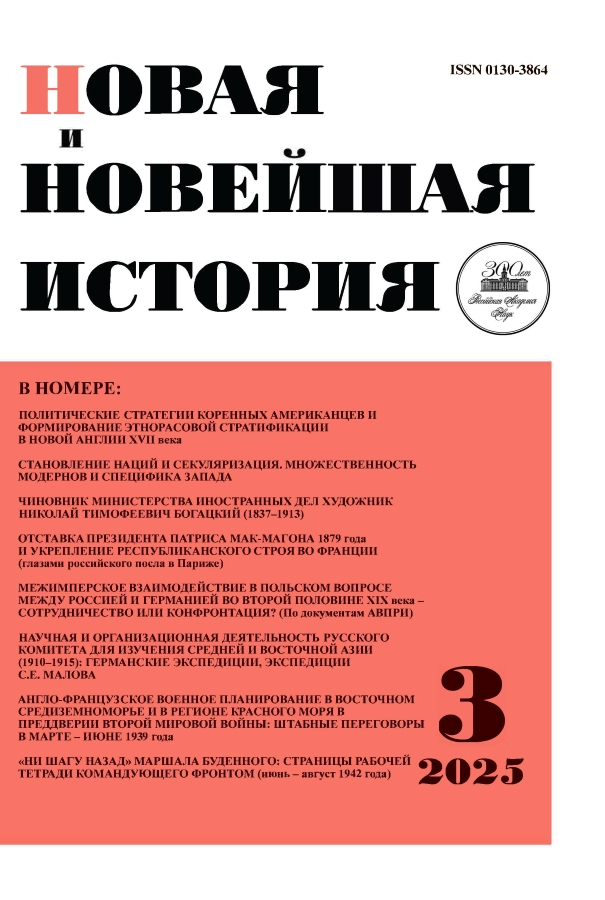Native American Political Strategies and the Development of Ethno-Racial Stratification in Seventeenth-Century New England
- Авторлар: Aleksandrov G.V.1
-
Мекемелер:
- Russian State University for the Humanities
- Шығарылым: № 3 (2025)
- Беттер: 41-54
- Бөлім: Modern history
- URL: https://cardiosomatics.ru/0130-3864/article/view/685319
- DOI: https://doi.org/10.31857/S0130386425030043
- ID: 685319
Дәйексөз келтіру
Аннотация
The political agency of Native American populations in early colonial New England is frequently underestimated. Both popular culture and, at times, scholarly discourse depict Native Americans as passive victims of colonial expansion, lacking the capacity to shape the transformative processes that redefined their world. This perspective, rooted in the nineteenth-century “noble savage” trope, fails to capture the complexity of Native political engagement. This article explores the diverse strategies employed by Native American leaders throughout the seventeenth century as they sought to navigate and influence colonial structures. While individual leaders pursued diplomatic relationships with colonial authorities, collective strategies – most notably conversion to Christianity – were employed to secure a place within the emerging colonial order. Key examples of successful political adaptation include Ousamequin, the first sachem to forge an alliance with the colonies; Uncas, the Mohegan leader; and Robin Cassacinamon, the Pequot intermediary who played a crucial role in Native-colonial relations. Although their approaches varied, they shared common elements that underscore the adaptability of Native American political cultures. Rather than relying solely on resistance, these strategies shaped colonial history, influencing immediate political developments and contributing to the formation of ethno-racial stratification in both colonial and later American society.
Толық мәтін
Авторлар туралы
Gleb Aleksandrov
Russian State University for the Humanities
Хат алмасуға жауапты Автор.
Email: glaleksandrov@gmail.com
ResearcherId: AGN-7482-2022
кандидат исторических наук, научный сотрудник
Ресей, MoscowӘдебиет тізімі
- Aleksandrov G. The Politics of Intercultural Education: Native-colonial Relations in the XVII century New England Language Manuals // Proceedings of the Russian-American Research Nexus Forum. Vol. 1. Moscow, 2022. Р. 29–56.
- Axtell J. The Invasion Within: The Contest of Cultures in Colonial North America. Oxford, 1986.
- Bradford W. Of Plymouth Plantation (1620–1647). New York, 1981.
- Calloway C.G. New Worlds for All: Indians, Europeans, and the Re-making of Early America. Baltimore, 2013.
- Calloway C.G. Pen and Ink Witchraft: Treaties and Treaty Making in American Indian History. Oxford, 2013.
- Cave A. The Pequot War. Cambridge, 1996.
- Cogley R. John Eliot’s Mission to the Indians before King Philip’s War. Cambridge, 1999.
- Cook S.F. 1973. The Significance of Disease in the Extinction of the New England Indians // Human Biology. 1973. Vol. 3. P. 489–490.
- De Forest J. History of the Indians of Connecticut from the Earliest Known Period to 1850. Hartford, 1851.
- Fisher J., Silverman D. Ninigret, Sachem of the Niantics and Narragansetts: Diplomacy, War, and the Balance of Power in Seventeenth-Century New England and Indian Country. Ithaca, 2014.
- Gardener L. Left Lion Gardener his Relation of the Pequot Warres // MHS Collection, 3rd series. Vol. 3. Boston, 1833. Р. 131–161.
- Gookin D. Historical Collections of the Indians in New England. New York, 1970.
- Hoornbeek B. An Investigation into the Cause or Causes of the Epidemic Which Decimated the Indian Population of New England, 1616–1619 // New Hampshire Archeologist. 1976. Vol. 19. P. 38.
- Jennings F. Empire of Fortune. New York, 1990.
- Jennings F. The Ambiguous Iroquois Empire: The Covenant Chain Confederation of Indian Tribes with English Colonies. New York, 1984.
- Jennings F. The Invasion of America: Indians, Colonialism and the Cant of Conquest. Chapel Hill, 1975.
- Johnson E. “Some by flatteries and others by threatenings”: Political strategies among Native Americans of seventeenth-century southern New England. 1993 // URL: https://www.proquest.com/openview/be12c51664bf7fa9d12c92cc089c8e56/1?pq-origsitegscholar&cbl18750&dissy (access date: 04.09.2024).
- Johnson E. Wonder-working Providence of Sion’s Saviour in New England (1654). New York, 1910.
- Knapp A.P. Connecticut’s Yesteryear: So Saith the Wind. Old Saybrook (CT), 1985.
- Mason J. A Brief History of the Pequot War. Boston, 1736.
- McBride K. The Legacy of Robin Cassacinamon: Mashantucket Pequot Leadership in the Historic Period. Northeastern Indian Lives, 1632–1816. Amherst, 1996.
- Oberg M.L. Uncas, First of the Mohegans. Ithaca, 2003.
- Pulsipher J. “Subjects... Unto the Same King”: New England Indians and the Use of Royal Political Power // Massachusetts Historical Review. 2003. Vol. 5. Р. 29–57.
- Records of the United Colonies of New England. Boston, 1853.
- Salisbury N. Manitou and Providence: Indians, Europeans and the Making of New England, 1500–1643. New York, 1984.
- Saltonstall N. A New and Further Narrative of the State of New England being a Continued Account of the Bloody Indian War // King Philip’s War Narratives. New York, 1966.
- Stone W.L. Uncas and Miantonomoh: A Historical Discourse. New York, 1842.
- Sylvester H. Indian Wars of New England. Vol. 1. Boston, 1910.
- Weeks A.G. Massasoit of the Wampanoags: With a Brief Commentary on Indian Character, and Sketches of Other Great Chiefs, Tribes, and Nations. Norwood (Mass.), 1919.
- Williams R. A Key into the Language of America (1643). Detroit, 1973.
- Williams R. The Correspondence of Roger Williams, 1629–1653. Vol. I. Hanover; London, 1988.
- Winthrop J. The Winthrop Papers. Vol. 5. New York, 1968.
- Winthrop J. Winthrop’s Journal. New York, 1908.
- Woodward W. Prospero’s America: John Winthrop, Jr., Alchemy, and the Creation of New England Culture, 1606–1676. Chapel Hill, 2010.
Қосымша файлдар









